![]() 1st Battalion 22nd Infantry
1st Battalion 22nd Infantry ![]()
22nd Infantry Memorabilia
Page 1
|
|
Left: Cap plate for a shako At the top is the inscription:
At the bottom is the inscription:
This cap plate was found |
|
Above: A US enlisted man The plates were made of The cap plate found at |
**********************
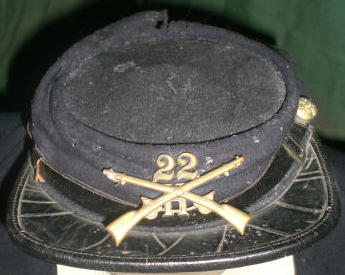
Model 1872 forage cap
for Company H 22nd Infantry
The insignia is very unusual, with the Company letter
being applied behind the crossed muskets.
**********************
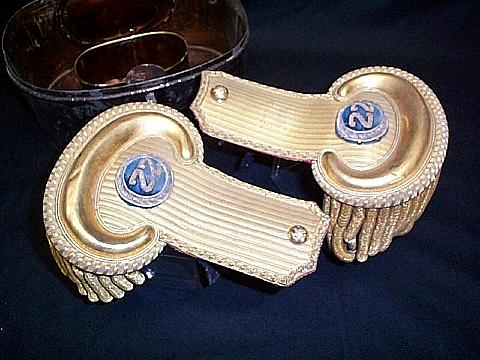
22nd Infantry Officer's
dress shoulder epaullettes, worn from 1866-1872.
The Regiment's number is embroidered on an Infantry Branch blue
colored velvet disc.
Sadly, the rank is missing from these examples. It would have
been placed between the
Regimental number and the button at the collar end of the
epaullette.
**********************
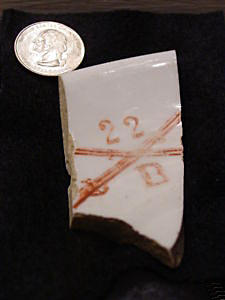
Shard from a plate or
saucer from Company B 22nd Infantry.
This example was sold on ebay, and comes from the Kiah Buckner
Museum in Hardin Montana.
The 22nd Infantry was in the Hardin area of Montana during the
1873 Yellowstone Expedition
led by Colonel David Sloane Stanley of the 22nd.
**********************
|
Target
record book for rifle qualification belonging to March, 1881 Cottrell was
born in Indiana in 1859. He enlisted in Company D Cottrell was
discharged as a Private on December 18, 1885 |
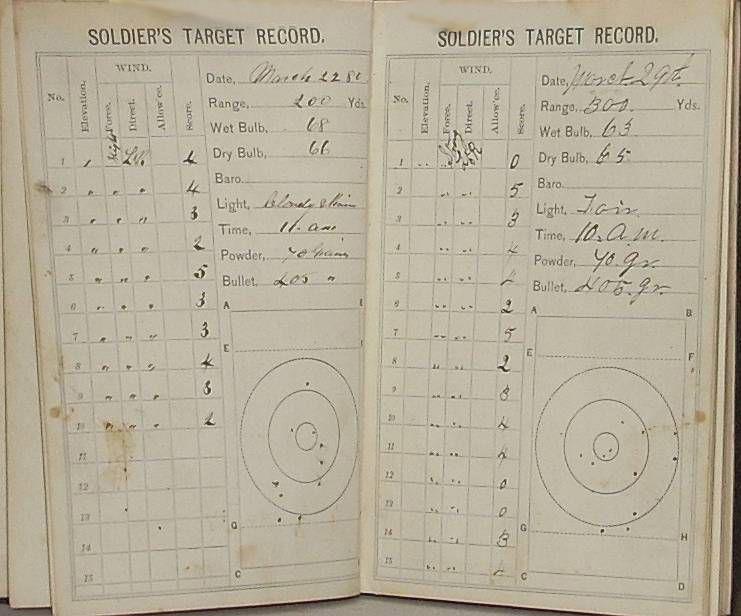
Target record book for
rifle qualification belonging to
Private George W. Cottrell of Company D 22nd Infantry, March 1881
Left page is his score at 200 yards, right page for 300 yards.
As noted by the weight of the bullet indicated (405 grains),
Cottrell was firing the "trapdoor Springfield" rifle in
45-70 caliber.
**********************
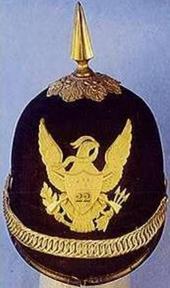
Model
1881 Foot Officers Dress Helmet for 22nd Infantry
Worn with the full dress uniform,this "European" style
helmet
was introduced in 1872, and with modifications,
was worn with the dress uniform for about 35 years.
This example has the model 1881 eagle helmet plate.
**********************
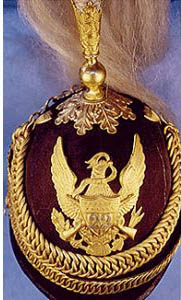
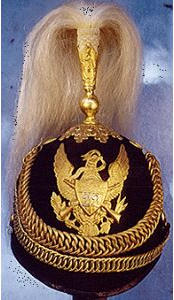
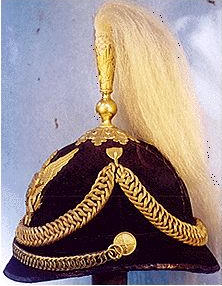
Model 1881 Mounted
Infantry Officers Dress Helmet for the 22nd Infantry
The number "22" is made of German silver and
individually affixed to the helmet plate.
**********************
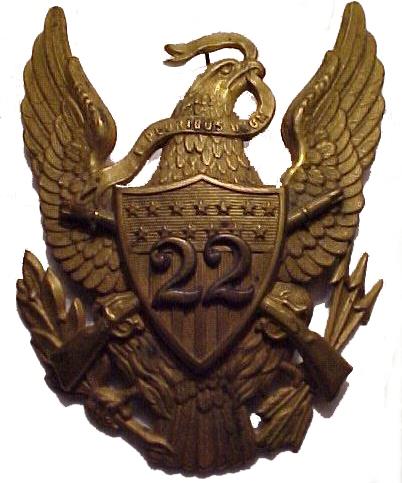
Helmet plate for 22nd
Infantry Regiment Foot Officer's helmet
1881 - 1904
**********************
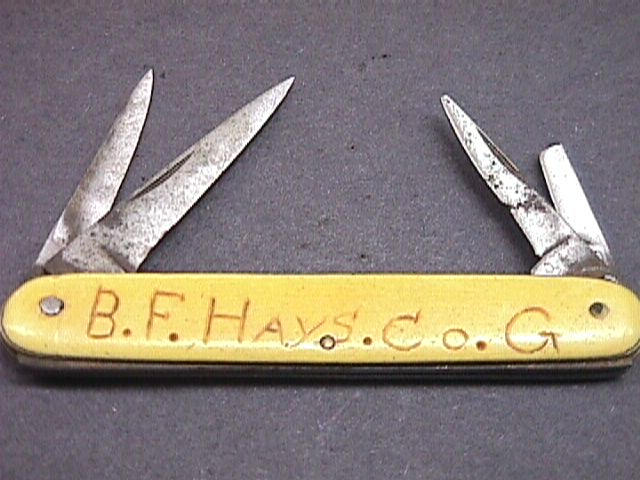
Pocket knife of B.F. Hays of Company G 22nd Infantry
Benjamin F. Hays was
born in Saltillo, Indiana in 1871. He enlisted as a Private for a
period of three years
in Company G 22nd Infantry on June 2, 1898 at Fort Crook,
Nebraska. His enlistment record indicated he stood
5 feet 8 inches tall, had light brown hair, blue eyes and a fair
complexion. His previous occupation was listed as
Farmer. He was assigned to his Company on September 9, 1898 at
Camp Wikoff, New York. Hays served with
the 22nd Infantry in the Philippines and was discharged on June
28, 1901 at the Presidio of San Francisco,
California with the rank of Corporal and a character reference of
Excellent.
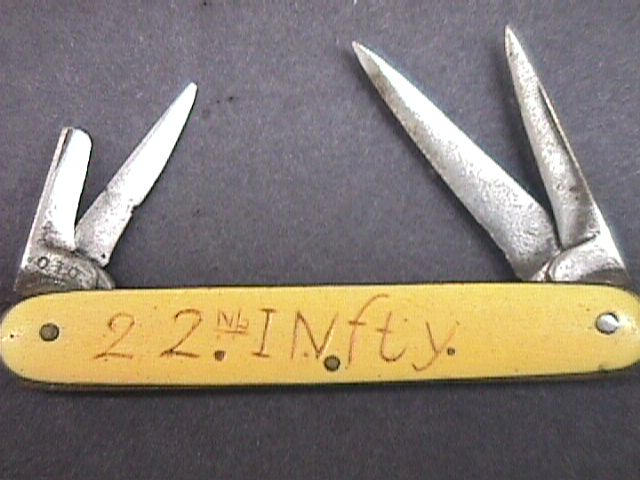
Pocket knife of B.F. Hays of Company G 22nd Infantry
**********************
|
Fifteen cent
token from the From the Token Store website |
|
|
Two cent
billiard token Most likely from 1888-1896 |
|
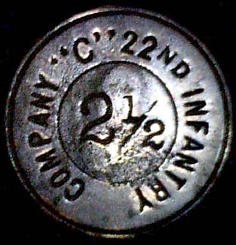
Two and one half cent
token from
Company C 22nd Infantry
date unknown
**********************
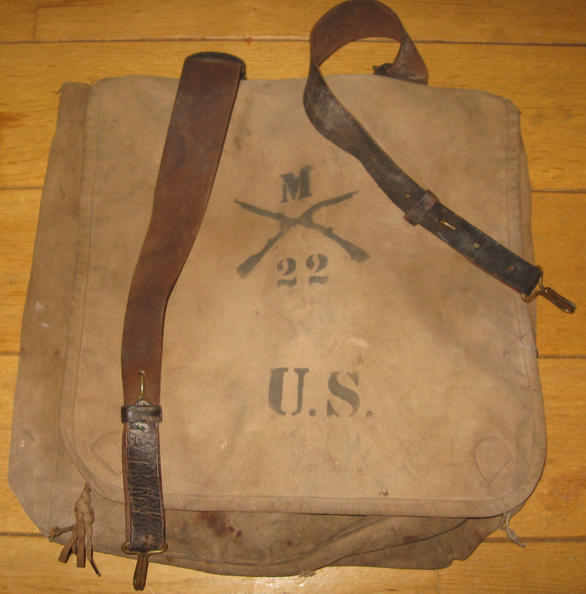
Model 1898 haversack for
Company M 22nd Infantry with initials “JWG”
and name “GLASS” marked on reverse. Used by Private
John W. Glass.
John W. Glass was born
in New York City, New York in July 1879. He enlisted as a Private
for a period of
three years in the U.S. Army on February 20, 1902 at Portland,
Maine. He stood 5 feet 8 inches tall,
had light brown hair, blue eyes and a dark complexion. His
previous occupation was listed as Fireman.
John W. Glass was
assigned as a Private to Company M 22nd Infantry and joined the
Company at Fort Crook,
Nebraska on March 22, 1902 as one of 330 Privates assigned to the
Regiment between March 12 and March 26, 1902.
Webmaster's collection
**********************

Pin for 22nd Infantry,
Spanish-American War era.
This may have been affixed to the detachable white shoulder strap
of the 1899 Enlisted Uniform,
or it might be an early example of a "sweetheart pin".
Webmaster's collection
**********************
The following images are
of a Soldier's Handbook, the version printed in 1898,
issued to Charles D. Rueger of Company L 22nd Infantry.
Charles D. Rueger was
born in Rockey Ridge, Ohio in 1879. He enlisted in the 22nd
Infantry
on December 19, 1898 at Cleveland, Ohio. He was assigned to
Company L on December 21, 1898
at Fort Crook, Nebraska. His enlistment record indicated he stood
5 feet 8 ¼ inches tall, had
light brown hair, blue eyes and a fair complexion. His previous
occupation was listed as Mason.
Rueger was discharged on
December 18, 1901 at Manila, Philippines
with the rank of Private and a character reference of Excellent.
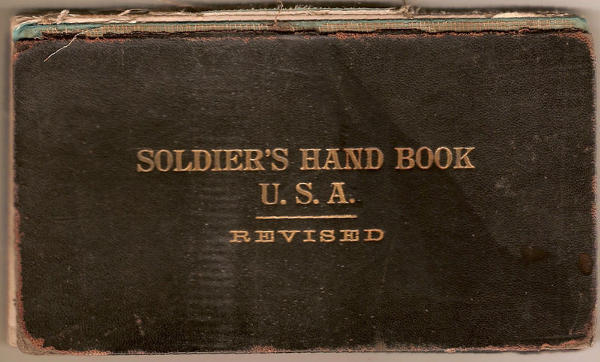
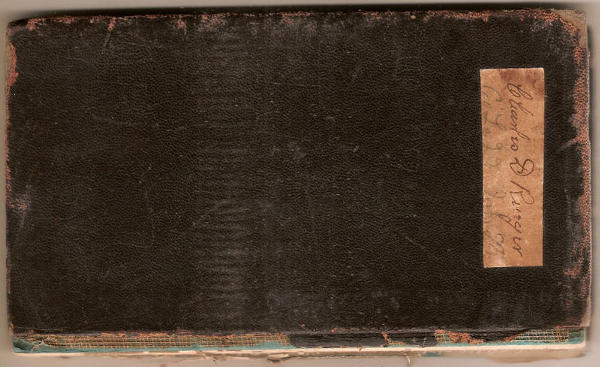
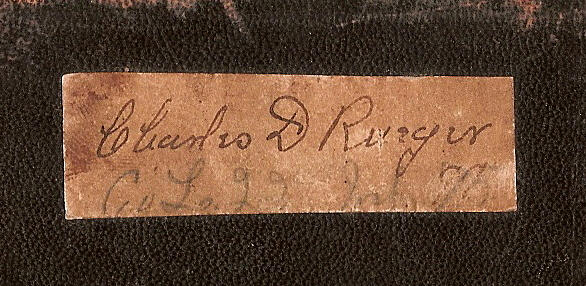
|
|
Front page (left) and contents (right) of the handbook
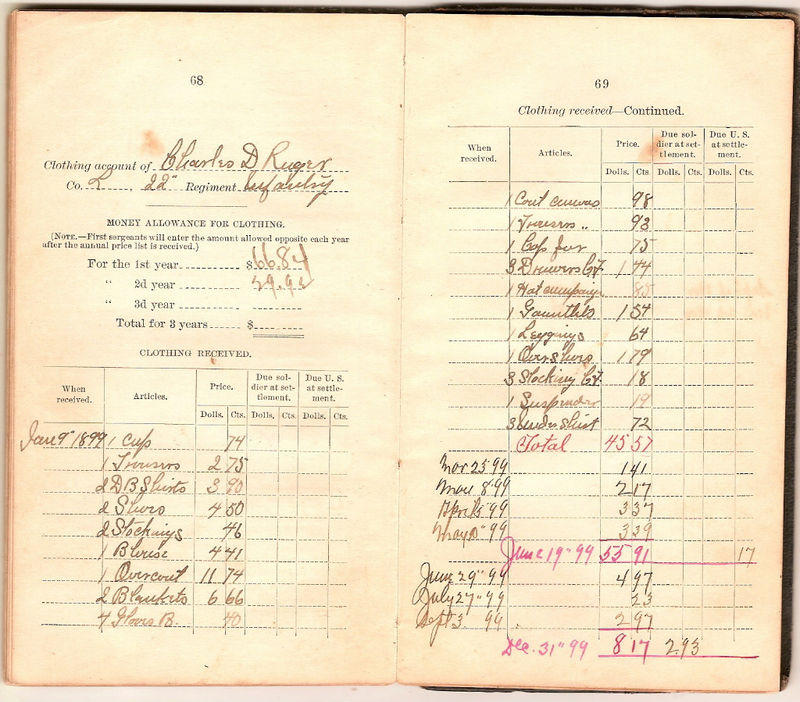
Clothing account of
Charles D. Rueger. Company L did not exist in the Regiment until
late 1898,
when, upon receipt of orders for deployment to the Philippines,
Companies L and M were formed.
Rueger's initial issue of clothing can be seen started on the
left page and continuing over to the right.
On January 9, 1899, at Fort Crook, Nebraska, Rueger was given his
clothing issue, just 18 days
before the Regiment left Ft. Crook for San Francisco to board the
transports to the Philippines.
The next entry on the right page is March 23, 1899, approximately
two weeks after Rueger landed
in the Philippines, and the entries on this page continue through
the last day of the year.
**********************
|
Souvenir
"ladder" badge This example is
marked for |
**********************
|
Left: Model 1902
Enlisted dress cap Above: Closeup of cap insignia |
**********************
The following letter was
written by James R. Goodale, a 1st Lieutenant in Company H 22nd
Infantry,
to Colonel William Cary Sanger, the Assistant Secretary of War,
whose office was in Washington D.C.
Goodale had sent Sanger a fighting knife captured in the
Phillipines by the 22nd Infantry, and the letter relates
the origin of the knife. The knife was a Visayan Bolo, also
called a Telebong, and came from Igbaras, Province of Iloilo,
Panay, Phillipine Islands. The letter was sent from Fort Crook,
Nebraska, and is dated January 18, 1903.
The letterhead is an interesting example of an attempt to create
a coat-of-arms for the 22nd Infantry. The official
coat-of-arms and Distinctive Insignia were not created and
authorized by the Department of the Army until 1923.
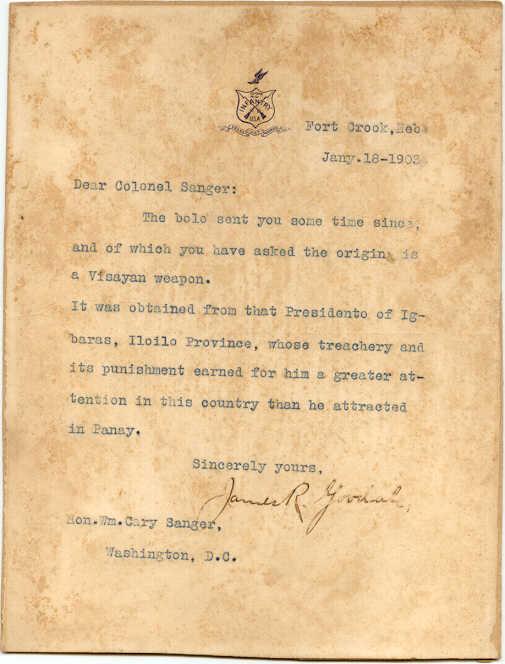
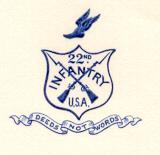
Detail of the
letterhead. The significance of the winged shoe is unknown.
Extremely fascinating is the revelation that the motto
"Deeds Not Words" was used,
twenty years before it was officially authorized for the 22nd by
the Department of the Army.
Webmaster's collection
**********************
|
Twenty-five
cent token for the 22nd Infantry The Regiment was
stationed along Interesting and
early use Webmaster's collection |
|
**********************
The following
identification discs, more commonly called "dog tags"
were in use from approximately 1898 into the 1930's.

Private John E Nelson Company G 22 Infantry
Webmaster's collection
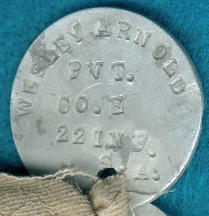
Private Wesley Arnold Company E 22nd Infantry
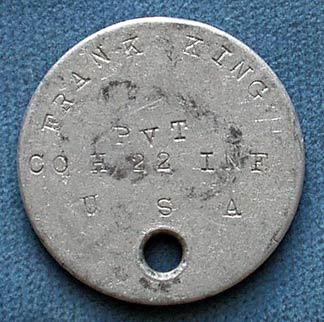
Private Frank King Company H 22nd Infantry
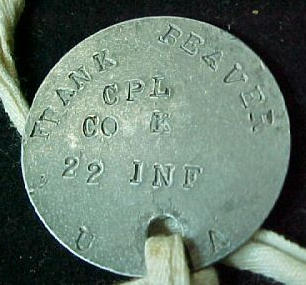
Corporal Frank Beaver Company K 22nd Infantry
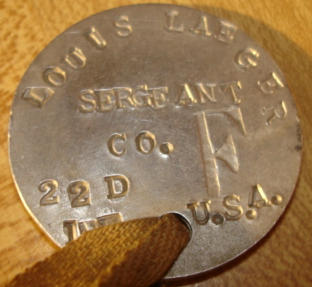
Sergeant Louis Laeger Company F 22nd Infantry
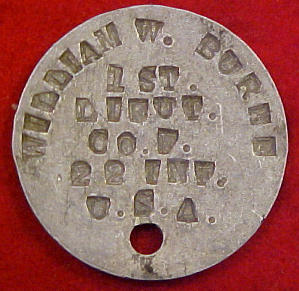
1st Lieutenant William W. Burke Company F 22nd Infantry
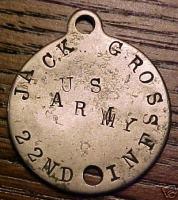
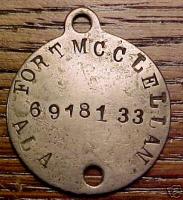
Front and back views of
dog tag for
Jack Gross 22nd Infantry (rank and Company unknown)
and marked for Fort McClellan, Alabama
The Regiment had detachments at Fort (Camp) McClellan
from as early as 1922 and into 1940.
**********************
Home | Photos | Battles & History | Current |
Rosters & Reports | Medal of Honor | Killed
in Action |
Personnel Locator | Commanders | Station
List | Campaigns |
Honors | Insignia & Memorabilia | 4-42
Artillery | Taps |
What's New | Editorial | Links |